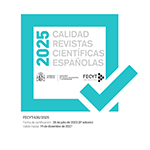Beyond all reasonable doubt: the poisoned legacy of classical scepticism in the contemporary epistemic context
Abstract
Our times seem to be afflicted by scepticism. But what form of skepticism is it the one that truly affects us, and how have we inherited this legacy from ancient thought? This work explores the contemporary rise of the so-called post-truth, fake news, and other concerning phenomena from an epistemological standpoint. It delves into the historical influence of philosophical scepticism in its two main variants: Pyrrhonism and Academic skepticism. Special attention is paid to the relationship that each of these schools had with the infallibilist thesis, their revival during the Renaissance, and their influence through Descartes to the present day. Finally, it is claimed that it is the infallibilist interpretation of scepticism, as well as its disconnection from any practical motivation, rather than scepticism per se, to which these harmful effects should be attributed.
Downloads
Article download
License
In order to support the global exchange of knowledge, the journal Logos. Anales del Seminario de Metafísica is allowing unrestricted access to its content as from its publication in this electronic edition, and as such it is an open-access journal. The originals published in this journal are the property of the Complutense University of Madrid and any reproduction thereof in full or in part must cite the source. All content is distributed under a Creative Commons Attribution 4.0 use and distribution licence (CC BY 4.0). This circumstance must be expressly stated in these terms where necessary. You can view the summary and the complete legal text of the licence.











